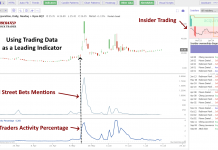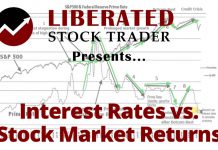★ Stock Trading Guides ★
- Stock Trading vs. Investing
- Day Trading: A Data-Driven Guide
- AI Trading Strategies & Tools
- 8 Steps to Build an Algo Trading System
- 5 Professional Trading Courses
- Pro Guide to Trading News Events
- Swing Trading: A Data-Driven Guide
- 13 Pro Stock Options Insights
- Scalp Trading Tactics Proven By Data
- Is Trading Gambling
- Trading Parabolic Stocks
- Buy the Rumor and Sell the News
- Dealing with Fomo
- The King of Quants
- Buying Stocks
- Short Sellling
- Margin Trading: The Reality
- How the Market Really Works
- Trading Futures Markets: A Guide
- Learn Stock Trading Fast & Free
- 6 Important Market Cycles
- Stock Exchanges Explained
- Delisted Stocks
- Understanding Liquidity
- A Penny Doubled & Compounding
- Points in Stocks
- Market Rallies: Mastering Market Surges
- Quad Witching, Volatility & Volume
- Interest Rates & Stocks: A 60-Year Guide
- Buybacks: How to Trade Them
- Broker Checks
- 101 Stock Market Terms You Should Know
- Next Section – Investing >>
Stock Trading Guides
Discover our ultimate collection of stock trading guides crafted from 25 years of experience! Dive into our comprehensive resources on day and swing trading to learn effective strategies for buying stocks.
Sell Signals In Stock Trading: How I Identify, Evaluate, and Act
A sell signal gives traders a heads-up on when to consider closing positions, helping them lock in gains or cut losses using actual triggers, not just hunches.
8 Step Guide: I Start an Algo Trading System From Scratch
To create an algo trading system, I recommend choosing a strategy, selecting a trading platform, choosing the asset type, selecting the indicators and patterns, backtesting, and refining the strategy.
How I Find and Act On Buy Signals In Stock Trading
A buy signal is essentially an indicator or event that suggests it may be a good time to purchase a particular stock, whether based on technical data, chart patterns, or intrinsic value.
The Truth About AI Trading & The Strategies & Tools to Use
Most AI trading tools do not use real AI machine learning and large language models. The majority of self-proclaimed AI trading tools are algorithmic and do not actually learn.
Insider Trading: How to Find, Analyze & Profit From It
Legal insider trading happens when corporate insiders trade their own company's stock following SEC reporting rules. Illegal insider trading, in contrast, involves trading a public company's stock based on nonpublic, material information.
60 Year Analysis Shows How Interest Rates Affect Stocks
Interest rates significantly impact the stock market. Low rates mean cheap money for businesses and consumers, boosting demand for goods and services. This drives up companies' profits and stock prices. Conversely, rising rates make borrowing costlier, reducing spending and causing stock prices to fall.






